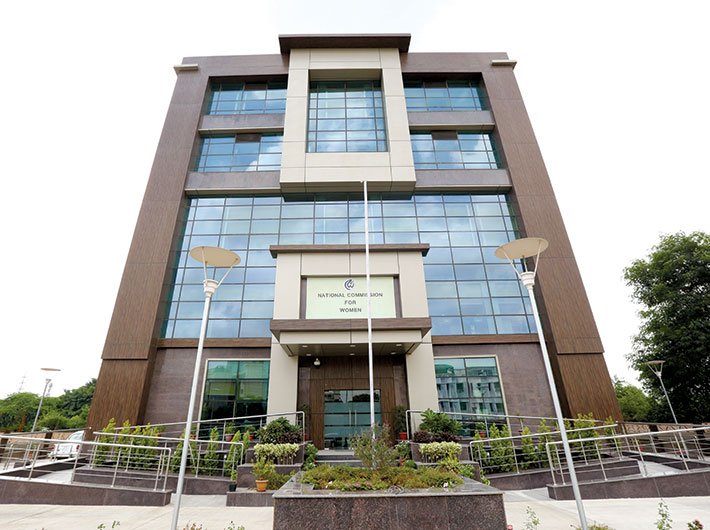The national commission for women is seeking powers for itself so that it can safeguard women rights
The national commission for women (NCW) will soon move the supreme court (SC). But this time it won’t be to seek justice for an aggrieved woman; it would be to empower itself, to be heard and to be taken seriously. And equally important, to lose the unwanted title of ‘toothless’ thrown at it every now and then.
The commission’s chairperson Lalitha Kumaramangalam, in an exclusive conversation with Governance Now, talked about the NCW’s intent to extend the mandate of its working (see interview). She is currently in consultation with senior lawyers for approaching the apex court on this matter.
READ Interview: We should be ranked equal to the SC, ST commissions, says NCW chief
“There is complete fallacy to these talks that the Act is weak. However, there are sections in the mandate that have not been put to ideal use. Now we are planning to approach the SC to understand how the mandate can be extended. It [NCW Act] says that we have the powers of a civil court but these have never been used due to certain reasons,” says Kumaramangalam.
“We want the court to spell out up to what extent we can go, especially when we are not able to exercise our powers to search and seize in a case,” she adds.
The grievances seem legitimate. Sample these events of the last three months:
* In June, the NCW and the Maharashtra state women commission had summoned actor Salman Khan for his controversial rape remark made while talking about a shooting sequence of one of his movies. Khan, however, chose not to appear before either of the commissions.
* In July, the NCW issued summons to the sacked BJP leader Dayashankar Singh and BSP leader Naseemuddin Siddiqui for their derogatory remarks on women. Neither appeared before the NCW.
* The very next month the NCW summoned the doctor who had conducted the medical test of a mother-daughter who were raped at gunpoint on a highway in Bulandshahar. The doctor had allegedly mistreated the victims and asked inappropriate questions to the minor victim. He too played truant.
Problems are many
The commission was set up in 1992 under the National Commission for Women Act, 1990. The NCW has the mandate to review the constitutional and legal safeguards for women, recommend remedial legislative measures, facilitate redressal of grievances and advise the government on all policy matters affecting women. However, it soon found itself in shackles and virtually powerless. Today, the commission is desperately fighting for its own empowerment.
The major reason for NCW’s ordeal stems from the wanton interference and financial control exercised by the ministry of women and child development (MoWCD), even though the commission is an autonomous and statutory body.
Since NCW’s funds come from the ministry, the two often find themselves at loggerheads on key policy issues. Take the recent case of the anti-trafficking bill. The NCW had rejected the trafficking of persons (prevention, protection and rehabilitation) bill, 2016, drafted by the ministry. Instead of a new law, the commission wanted strengthening of existing provisions of the Immoral Traffic (Prevention) Act. The clash of ideas could have been used for a wider debate on a key law concerning women. However, the ministry acted revengefully and kept the commission out of the consultations for the draft national policy for women, 2016.
Activists associated with various parties across the political spectrum have similar views on the efficiency of NCW. For example, Girija Vyas, a former NCW chairperson and Congress leader, says, “The government has never taken NCW seriously. The policy is to adjust the commission somewhere in the process.” She feels that instead of taking the commission as an ‘adjustable seat’, the government should extend support and empower it.
The commission has always faced shortage of funds. This year, it received the highest ever allocation of Rs 20 crore as against the demand for Rs 100 crore. Till a year ago, the commission’s annual budget was pegged around Rs 9-10 crore.
To add insult to the injury, under the protocol, the NCW chairperson has a lower status than the heads of other statutory bodies. For example, the chairperson of the national commission for scheduled castes and of the schedule tribes have the status of a cabinet minister. The national human rights commission chairperson is a former chief justice and hence enjoys an exalted status. In comparison, the NCW head enjoys the status of a secretary to the government. And given the hierarchy in Indian bureaucracy, this difference can have a significant impact on the functioning of the commission.
‘If a scheduled caste or a minority commission chairperson can enjoy the rank of a cabinet minister, why can’t the NCW chairperson?’ NCW members have been posing this question to the authorities for years. “When we speak to a person who is above the rank of our chairperson, he obviously doesn’t give ear to the voice of the commission. So, if we don’t raise the status of NCW, how do you expect someone holding a rank higher than secretary to listen to us?” asks Shamina Shafiq, a former member.
NCW hits the hurdle each time it investigates a case of violation of women’s rights as senior bureaucrats do not cooperate with it. This impacts the investigation adversely. As a result the commission can hardly do its investigation and limits its intervention to an inquiry. However on ground, the commission’s intervention makes a difference to women. Even though the commission does not have quasi-judicial powers, members assert that mere intervention of the commission into case of atrocities builds pressure on the police to expedite the investigations.
As of now, the commission mostly deals with cases where FIRs are not registered by police, or when FIRs are registered but no action is taken. The commission members have demanded setting up of a police chowki within its premises where the aggrieved women can lodge ‘zero FIR’, which, in turn can be transferred to the concerned police station.
NCW also takes suo moto cognisance of non-implementation of laws and non-compliance of policy decisions. The members complain that the commission often receives poor response from the police and other officials.
The commission also conducts research and studies on issues affecting women and sponsors similar work of independent organisations. “What actions are being taken on the findings of the research? I don’t find NCW doing much in that direction,” says Shafiq.
The commission faces huge staff crunch. Currently, the commission is run by 37 employees and about 40 people hired on contract. But former and current members say that the commission needs at least 100 employees to function smoothly. Some even suggest that the seven-member NCW needs to be expanded. “You cannot expect every member to be well versed in law or research. Each commission member needs to have one research officer for assistance. During my tenure [2012-15], there was only one research officer in the commission,” says Shafiq.
Strangely, there is no effective coordination between the national and state commissions as the latter are autonomous and do not report to the national body. Also, there is no uniformity in the acts framed by different states for their respective commissions. Vyas agrees that there is a huge gap between the two bodies that eventually leads to lack of a coherent approach on women’s issues.
Some states like Kerala have bestowed sweeping powers on the women’s commissions. It has a DSP-rank police officer stationed inside its premises. The women can come to him to lodge their complaints. This way, the state commission gets an upper hand in cases where a woman is aggrieved. This is considered the best model for coordination between the commission and law-enforcing agencies.
The Kerala women commission members have a five-year tenure as against three for the national and other state bodies. The NCW has recommended a five-year fixed tenure for its members. Kumaramangalam says it takes at least four to five months for a chairperson or a member to understand the working of the commission. The last six months of the term, on the other hand, are spent in wrapping up. So literally, a member has an effective term of two or two and a half years.
In the past too NCW chairpersons have talked of taking the issue of their curtailed powers to court. None did it though. One wonders why powerful politicians like Vyas, who served as chairperson for two terms, could not press upon the government to empower the commission. Will Kumaramangalam, who is a former BJP leader, be able to pull the strings this time?
[email protected]
(The article appears in the October 1-15, 2016 issue)



